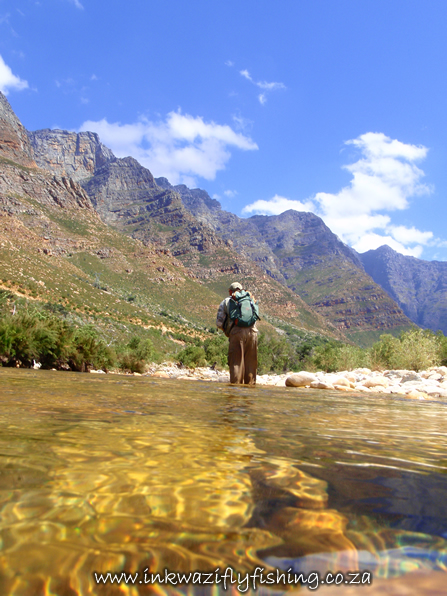The Self Fulfilling Prophecy:
I am sure that everywhere that trout swim we have all experienced one of these, “Self-Fulfilling Prophecies”, it is a common enough trap and actually quite a tricky one to get out of, even if you suspect that you may be a victim.
A couple of examples:
Years back I was a member of an angling club whose water, but not most of the membership, was based in Stutterheim in the Eastern Cape. Due to the lack of fly fishing opportunities in that neck of the woods and the relatively remote location of the water the members were scattered over a wide area. Port Elizabeth, Grahamstown, East London and the Hogsback, all miles apart. Thus as a means of getting everyone together on at least one occasion per year there was , what for want of a better word one might call, a “competition”. This wasn’t anything like the structured and highly organised World Championships, just a friendly get together with someone maintaining a rough tally of who caught what.
I recall the first one of these events in which I participated, having come fairly recently from the UK I set about fishing the way I had always back home. Floating line, long leader a single fly, probably a Hare’s Ear Nymph I suspect. In fact I didn’t own a sinking line at all in those days; I modelled my angling on the thoughts of Brian Clarke in his excellent book “The Pursuit of Stillwater Trout” (A C Black, 1975). Everyone else, every single angler for the entire weekend fished with sinking lines and flies most of which I had never heard of. Parson’s Glory I do remember being a particular favourite amongst many of the protagonists.
 The beautiful Gubu Dam, offering more than one way to fish if you are prepared to experiment.
The beautiful Gubu Dam, offering more than one way to fish if you are prepared to experiment.
The fishing hadn’t been exactly “On Fire”, but come the end of the weekend the winning angler had landed five fish or so, the next best four and a few of us down the order had caught three trout a piece.
As the results were being announced the angler next to me said in all seriousness, “you were the guy with the floating line weren’t you?” – “Floating lines don’t work around here”..
He wasn’t being unpleasant, I think that he was genuinely trying to be helpful, that was the generally held belief. That you needed a sinking line, preferably anointed with a Parson’s Glory, or some other pattern of questionable and undoubtedly colonial lineage. But if you look at it carefully there were some thirty anglers there for the weekend and something in the region of 20 fish captured. Of those twenty trout, three had been caught by “the guy with the floating line”.
Taking the stats a bit further (and I avoided stats throughout my college education so beware), the average catch of fish to the sinking line anglers was a bit over half a fish a person. The average catch of the anglers fishing a floating line (only me), was three. So on a mathematical front the floating line was six times more effective than the sinker, SIX times more effective, but the word was that “floating lines don’t work here”.
How is that possible? You would think that it was obvious, but it isn’t obvious and it isn’t because we are easily caught up in the self-fulfilling prophecy. Up until I came along with my floating line (out of ignorance more than anything else), all the fish in that dam were caught on sinking lines, all of them.
Read the catch return book and it would be “sinking line, sinking line, sinking line” but of course a little more insight and you realise that the anglers at this dam only ever fished sinking lines, the apparent efficacy of the technique isn’t exactly a surprise when you look at that bit of the equation. It becomes a self-fulfilling prophecy, a circular argument spawned by a lack of innovation or courage, of intellectual incuriosity which never has anyone pose the question “Why”. Mind you I have to admit that with 29 other anglers telling me I was wrong, had I owned a sinking line I could well have been tempted and fallen into the well laid trap.
 Why on earth should this fly be “the only one” that works, it doesn’t make sense.
Why on earth should this fly be “the only one” that works, it doesn’t make sense.
Another example comes from an area to the far north covered in small stocked dams, it is supposedly a “fly fishing Mecca” to read the brochures from the marketing department, although it isn’t really my cup of tea. Most of the impoundments are not large, some sport wooden jetties sticking out into the ponds to ease the pain of the woefully inadequate casting of many of the visitors.
The place tends to cater for the neophyte or at least the uninformed but at the same time does offer sport and more than a few people have started their fishing careers at such venues. That isn’t really the problem; the problem is that if you ask for “local advice” you will be told to “fish a Walker’s Killer or a Mrs Simpson”. The efficacy of those two patterns is clearly demonstrated once again in the catch return books where every fish caught has come to one of those two flies, page after page of entries to the point where the artificials take on near supernatural power.
Why on earth should that be so? It is highly unlikely that the fish are genuinely fixated on two specific patterns, particularly that they should remain so besotted irrespective of the season. Equally unlikely that there are many real food items left in those small and continuously re-stocked ponds which ever reach the size of these artificial concoctions, but there it is in black and white, every single fish captured comes to one of those two flies. Again powerful evidence until you question how many people fish anything else and the simple answer to that enquiry is none. The self-fulfilling prophecy again rears its ugly head, beguiling evidence that one technique or fly works better than all the others, supported apparently by reams of data.
As mentioned previously I don’t like statistics, I avoided the subject like the plague at college, no matter that it was guaranteed to come up in final exams. Statistics and statisticians are for the most part dreadfully dull, lectures in the subject can leave one seriously considering self harm as a means of staying awake, but stats’ do have a use. They afford us the ability to recognise the false prophecies handed down to an ill-informed public, piscatorial or otherwise.
No matter that you are looking at catch returns on specific water or wading through the marketing department’s endless assertions that XYZ shampoo removes up to 100% of dandruff flakes, one needs to be aware of the carefully fashioned falsehoods. Without studying mathematical models the best protection is to maintain an enquiring mind. That isn’t to suggest that you eschew all local knowledge, that would undoubtedly be a mistake, but it behoves us all to question the validity of some commonly held beliefs.
Perhaps the most valuable query of all is “Why”, why should that be so? Why should fish only feed in this way? Why should it be that all the trout are taken by one technique? It is quite possible that there is a good answer to the question; where perhaps the predominant food form available to the fish is indeed highly specific, or that the flow rates determine that the fish are all feeding deep down near the bottom of a stream, but there is also a high probability that the figures don’t add up. That what you are looking at is a self-fulfilling prophecy based on poor logic and dare I say it “sampling errors”. (Apparently I did learn something whilst chewing my own fingers off at college)
It brings to mind the joke about the motorist who is pulled over by traffic department officials for driving straight past a clearly demarcated “STOP” sign. His defence? “well you see officer, I don’t believe everything I read”..
So keep an open mind, don’t “believe everything you read”, and that applies to this blog as much as anything else. Trust your instincts, experiment and question the status quo, don’t be afraid of standing out from the crowd. Had others in our history not asked “Why?” we would still all be learning about the geocentric nature of the universe in school, everyone but milk maids would be dying of smallpox and those well enough to travel would remain fearful of falling off the edge of a flat earth when heading for their holidays.
Various books by the author of this blog are available on line from www.smashwords.com and www.inkwaziflyfishing.co.za


















